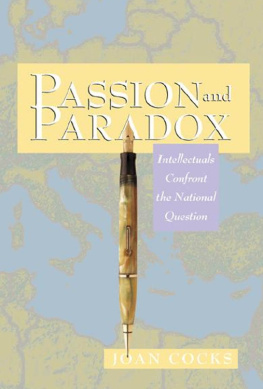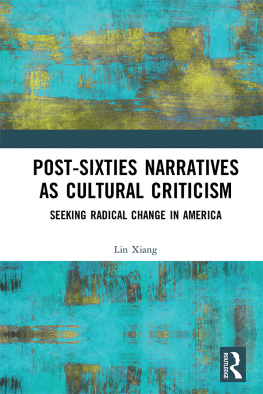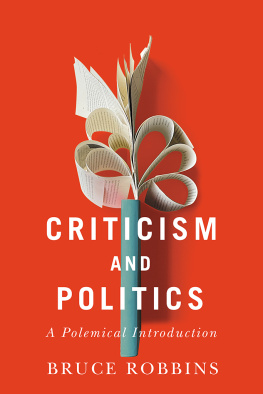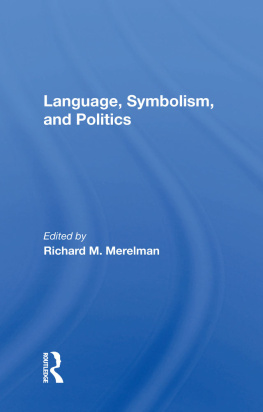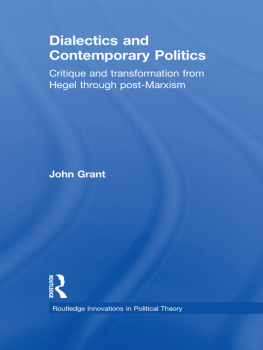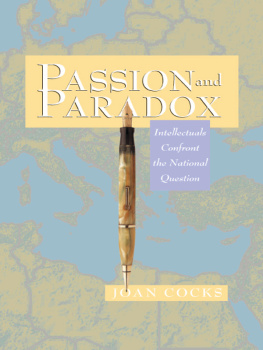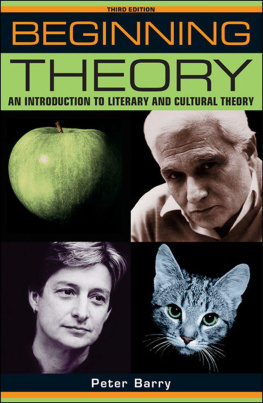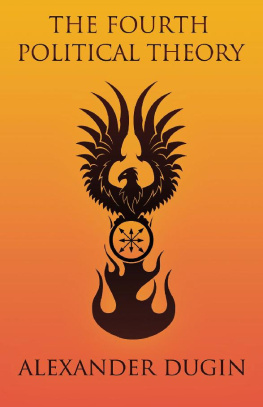First published in 1989
This edition first published in 2013
by Routledge
2 Park Square, Milton Park, Abingdon, Oxon, OX14 4RN
Simultaneously published in the USA and Canada
by Routledge
711 Third Avenue, New York, NY 10017
Routledge is an imprint of the Taylor & Francis Group, an informa business
1989 Joan Cocks
All rights reserved. No part of this book may be reprinted or reproduced or utilised in any form or by any electronic, mechanical, or other means, now known or hereafter invented, including photocopying and recording, or in any information storage or retrieval system, without permission in writing from the publishers.
Trademark notice: Product or corporate names may be trademarks or registered trademarks, and are used only for identification and explanation without intent to infringe.
British Library Cataloguing in Publication Data
A catalogue record for this book is available from the British Library
ISBN: 978-0-415-53401-7 (Set)
eISBN: 978-0-203-08796-1
(Set) ISBN: 978-0-415-63520-2 (Volume 30)
eISBN: 978-0-203-09392-4 (Volume 30)
Publishers Note
The publisher has gone to great lengths to ensure the quality of this reprint but points out that some imperfections in the original copies may be apparent.
Disclaimer
The publisher has made every effort to trace copyright holders and would welcome correspondence from those they have been unable to trace.
The Oppositional Imagination
Feminism, critique, and political theory
The Oppositional Imagination
Feminism, critique,
and political theory
Joan Cocks
First published 1989 by Routledge
11 New Fetter Lane, London EC4P 4EE
29 West 35th Street, New York, NY 10001
1989 Joan Cocks
Data conversion/typesetting
by Columns of Reading
Printed in Great Britain by
Richard Clay Ltd, Bungay, Suffolk
All rights reserved. No part of this book may be
reprinted or reproduced or utilized in any form or
by any electronic, mechanical, or other means, now
known or hereafter invented, including photocopying
and recording, or in any information storage or
retrieval system, without permission in writing from
the publishers.
British Library Cataloguing in Publication Data
Cocks, Joan
The oppositional imagination:
feminism, critique,
and political theory
1. Political science
I. Title
320
Library of Congress Cataloging in Publication Data
Cocks, Joan
The oppositional imagination:
feminism, critique,
and political theory
1. Political science
I. Title
320.19
ISBN 0-415-01512-X
0-415-03206-7
Acknowledgements
O ver the years, many students at Mount Holyoke College and in the Social Thought and Political Economy Program at the University of Massachusetts have kept up animated conversations with me on political theory and feminism. In an important sense, this book is really for them.
It would be possible but not, I think, entirely desirable to mention by name all the friends whom I enticed into arguments on what became the key questions of the pages to follow. Heated debates stretching late into the night seem to be a prelude to the development of critical theory. I hope the wear and tear on personal relationships has not been prohibitively high.
While I cannot thank individually all the colleagues who gave me thoughtful encouragement on this manuscript, I do want to make special mention of the members of The Donner Foundation Project on Gender in Context, who provided an alert audience for early versions of my chapters on Masculine/feminine. I also am indebted to Linda Nicholson for her many intelligent and helpful comments on the same chapters, and to Kristina Rolin, who sent from Finland a highly astute and sympathetic commentary on pages I had sent her.
There is no adequate way to thank my friend and colleague Meredith Michaels for the sensitive attention she has given this manuscript. She wrote perceptive comments on many chapters, in many versions, and in our frequent talks together she mulled over the twists and turns of my arguments with a lucid and generous understanding.
The three people who have been most central of all to this project are Karen Struening, Peter Cocks, and Craig Malone. I have spent years in pleasurable conversation with each of them on questions of politics, theory and feminism. These conversations have meant as much to me as my attempts to put my consequent thoughts on the page. Each has read and responded to large sections of the manuscript with great critical and political intelligence. Each, finally, has played a distinctive part in inspiring my description of figures who go against the grain. I must add a special note of appreciation to Craig Malone for his dedicated theoretical attention to this book in all of its phases. He pushed me hard on the conceptualization of my arguments, and he also inspected my sentences with a sharp editorial eye. To Peter Cocks, a different kind of appreciation for being his usual humorous and affectionate self even while living in close quarters with a writer at work on a book.
It is a pleasure to express my gratitude to the Rockefeller Foundation for awarding me a Humanities Fellowship near the start of this project, and to Mount Holyoke College for awarding me a Faculty Fellowship near the finish. Both gave me the privilege of thinking and writing in relative solitude. Gretchen de Roos assisted me with my footnotes at almost a moments notice. Finally, I would like to thank my very incisive and articulate editor, Nancy Marten.
Introduction
Things in Twos are Sometimes, but not Always, Dichotomies
T his is a book about opposites. My preoccupations hinge on the tension point between philosophy and poetry, abstract thought and concrete experience, culture and counter-culture, objective and subjective force, domination and rebellion, and last but not at all least, masculine and feminine. Some of these oppositions I mean to preserve, some to reconcile, some to dissolve, and some to break into fragments.
Perhaps the most prominent opposition here is that between political theory and practical life. The nexus joining the two elements of this classic pair is notoriously complex. If political theory lives off the practical circumstances of ruling, serving, warring and uniting, the questions it asks are set free by those circumstances rather than being directly about them. Sometimes they are set almost entirely free, so that the political theorist seems to resemble a philosopher inquiring into a universal order of things. Sometimes they are set hardly free at all, so that the theorist seems more like an historian immersed in a welter of once-lived details. In fact, however, the political theorist occupies a distinctly third place provoked by particular conditions and events to think about the right conceptualization, or real significance, or underlying logic, or moral or historical value, of all conditions and events that are broadly like or interestingly unlike them.


